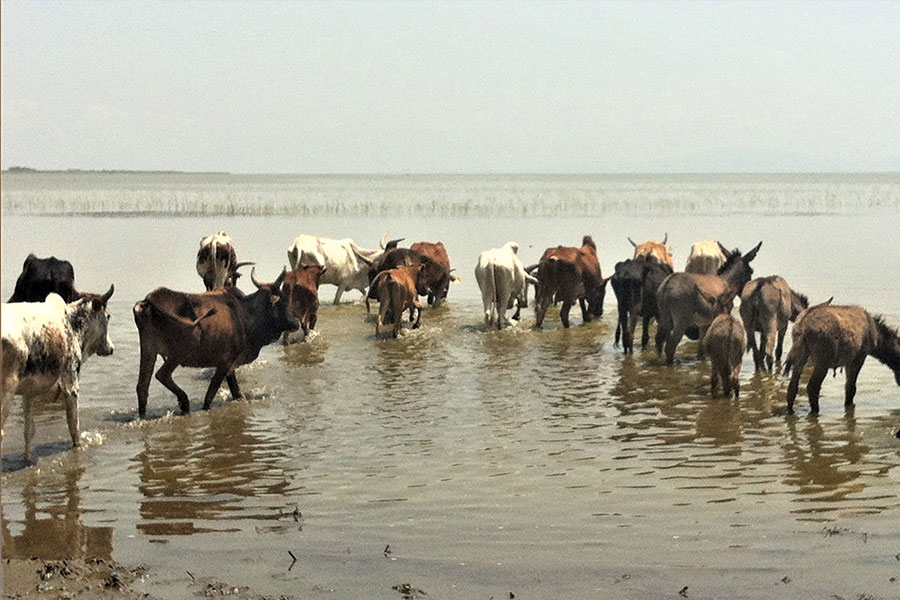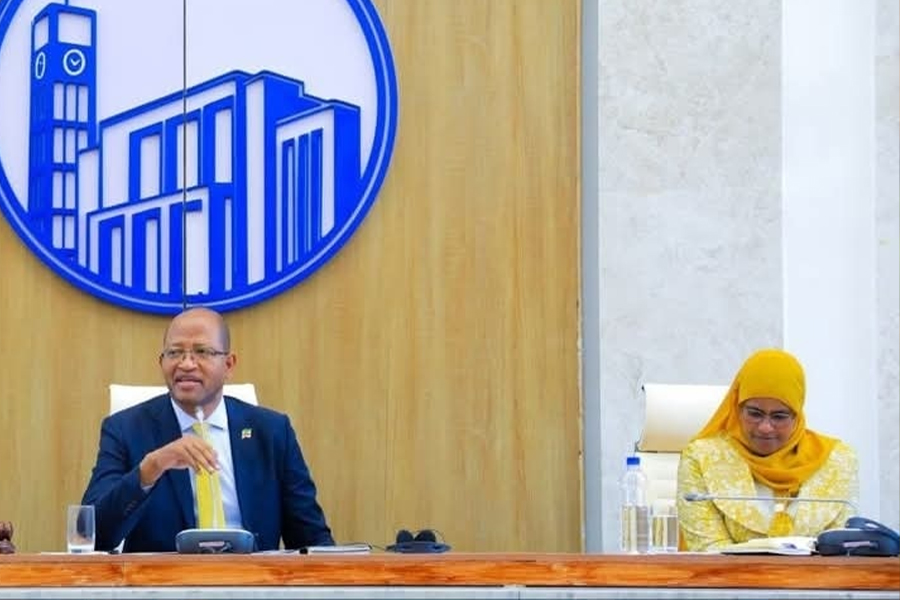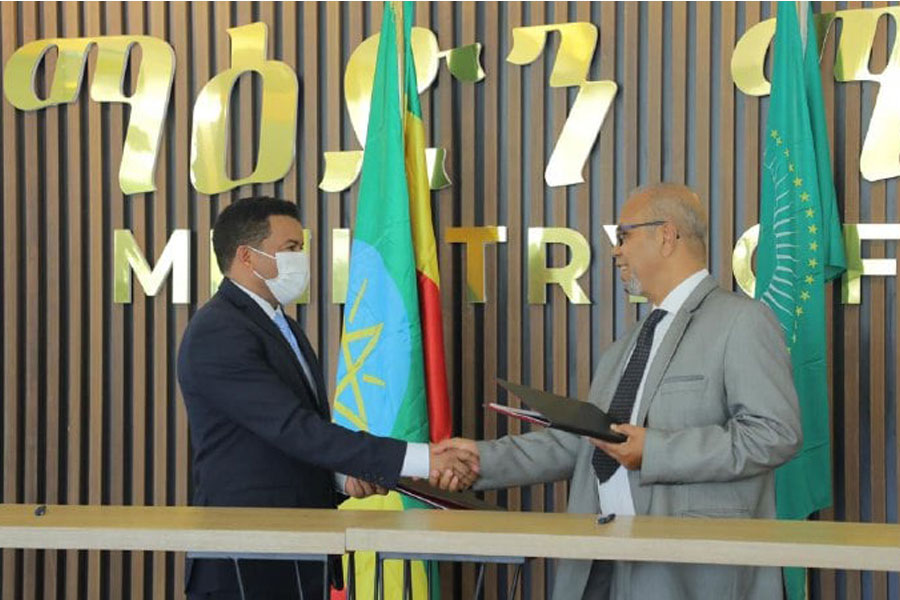
Radar | Mar 19,2022
Officials of the Ministry of Trade & Industry have placed a request for the central bank to make 600 million dollars available for the imports of crude palm oil this year, used as an industrial input by domestic plants.
Expected to be approved by the National Bank of Ethiopia (NBE) in the weeks ahead, the forex permit will be disbursed to four industrial-scale plants: Shemu, Phibela, W. A., and Hamaressa.
Hamaressa, an edible oil processing plant in Harer acquired by East Africa Group from the government, is under the family of Buzuayehu Tadelle, while W. A. is a company largely owned by Worku Aytenew, who has opened an industrial plant near Debre Markos town, Amhara Regional State.
The four plants have a combined production capacity of 91.8 million litres of edible oil a month but struggle to meet half partly due to a shortage of raw materials. The plants require the forex to produce at 60pc of this capacity, which authorities project can meet nearly half of the country's total annual demand of 900 million litres. If allowed, this will be the second batch of forex provision after the Ministry facilitated 47 million dollars for the edible oil factories eight months ago.
Experts from the Ministry conducted a subsequent survey jointly with the Food, Beverage & Pharmaceutical Industry Development Institute and concluded that Ethiopia needs close to a billion dollars to import edible oil the year. Domestic demand for edible oil has grown by two percent, compelling officials of the Ministry to urge the central bank for the provision of 345 million dollars in letters of credit for the Industrial Inputs Development Enterprise and the Ethiopian Trading Businesses Corporation to import processed palm oil.
They hope the supply gap will be covered through franco-valuta import permits, according to Eshete Asfaw, a state minister for Trade.
"Some have already begun importing," Eshete told Fortune.
Despite the colossal figures, the management of the plants would want to receive more than the recommended forex allocations to allow them to sustain production.
Phibela Edible Oil Factory, located in Bure Agro-Industrial Park in Amhara Regional State, will receive a permit for 285 million dollars to import crude palm oil. A subsidiary of Belayneh Kindie Group (BKG), a business conglomerate under a businessman bearing the same name, the plant has a capacity to produce 1.5 million litres a day. However, recurrent power outages, crunch in forex to import crude oil, and political instability to transport agricultural inputs have impeded production, according to Dereje Atnafu, a representative of BKG.
Kalkidan Mengistu, an agronomist, highlights the country's suitability for cultivating oilseeds and attributes the shortage of raw materials to the lack of attention given to the agricultural sector.
"Lowland areas like the Omo Valley, Gambela and Benishangul-Gumuz have the potential for palm cultivation," she said. "If the agricultural sector is prioritised, the country can meet its production potential."
Kalkidan urges government institutions to analyse alternative crops suitable for edible oil production, such as avocado, which gives comparatively higher yields and makes for healthier cooking oil.
Officials, however, believe importing the crude would enable the country to substitute imports of fully-processed edible oil, which cost an aggregate of six billion dollars over the last decade.
"It will significantly reduce our import bill," said State Minister Eshete, emphasising as much attention would be given to using locally-cultivated inputs.
There are three million farmers producing 770,000tn of oilseeds on almost 800,000ht of land. The last harvest season saw the production of oilseeds dwindle by seven percent.
Instability and growing disorder in the regions with the potential to grow the agricultural inputs remain a major concern to the industry.
"The instability in the country has disrupted supplies of sunflower seeds, soybean and sesame to the factory," said Dereje.
Shemu Plc runs an industrial oil mill in Dire Dawa with a capacity to process 1,100tn of oil a day. It is, however, operating at 52pc capacity due to a limited supply of crude oil for lack of forex. The company will get a share of 211.5 million dollars in letters of credit if the authorities at the central bank give their approval.
"We appreciate the gesture," said Tewodros Tadesse, head of communications for Shemu Plc, a company incorporated in 2008 with a registered capital of 118.4 million Br. "But the funds proposed might not be sufficient considering the escalating global price for crude palm oil."
The price of crude palm oil, sourced mainly from Malaysia and Indonesia, has more than doubled since May 2020, reaching 1,450 dollars a ton. International freight costs have increased at rates not seen since 2008 – to ship a 40-foot container from China to Europe costs 14,287 dollars, an increase of 500pc from last year.
PUBLISHED ON
Oct 02,2021 [ VOL
22 , NO
1118]

Radar | Mar 19,2022

Fortune News | May 31,2025

Radar | Sep 07,2025

Radar | Dec 17,2022

Radar | Jan 23,2021

Radar | Apr 27,2025

Fortune News | Jan 15,2022

Fortune News | Nov 24, 2024

Radar | May 18,2024

Radar | Apr 25,2020

Dec 22 , 2024 . By TIZITA SHEWAFERAW
Charged with transforming colossal state-owned enterprises into modern and competitiv...

Aug 18 , 2024 . By AKSAH ITALO
Although predictable Yonas Zerihun's job in the ride-hailing service is not immune to...

Jul 28 , 2024 . By TIZITA SHEWAFERAW
Unhabitual, perhaps too many, Samuel Gebreyohannes, 38, used to occasionally enjoy a couple of beers at breakfast. However, he recently swit...

Jul 13 , 2024 . By AKSAH ITALO
Investors who rely on tractors, trucks, and field vehicles for commuting, transporting commodities, and f...

Nov 1 , 2025
The National Bank of Ethiopia (NBE) issued a statement two weeks ago that appeared to...

Oct 25 , 2025
The regulatory machinery is on overdrive. In only two years, no fewer than 35 new pro...

Oct 18 , 2025
The political establishment, notably the ruling party and its top brass, has become p...

Oct 11 , 2025
Ladislas Farago, a roving Associated Press (AP) correspondent, arrived in Ethiopia in...